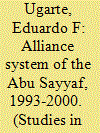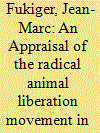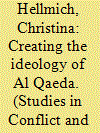| Srl | Item |
| 1 |
ID:
080905


|
|
|
|
|
| Publication |
2008.
|
| Summary/Abstract |
Unsettled conditions on Jolo and Basilan islands in the southwestern Philippines have seriously hampered efforts to obtain information about the Abu Sayyaf. The result has been a continuing ignorance over the most fundamental features of the group. In the attempt to broaden our understanding of its structure, this article examines data drawn from an array of sources in light of the authoritative work of Thomas Kiefer on the traditional Tausug alliance system on Jolo. It argues that the Abu Sayyaf consists of a system of alliance groups of the kind customarily found in Muslim Filipino societies
|
|
|
|
|
|
|
|
|
|
|
|
|
|
|
|
| 2 |
ID:
080906


|
|
|
|
|
| Publication |
2008.
|
| Summary/Abstract |
February 2007, the Animal Liberation Front claimed responsibility for the arson of two trucks in the Italian-speaking part of Switzerland. After analyzing this event, which triggered an unusual media response in the country, this article assesses recent and past actions of the radical animal liberation movement in Switzerland for the period from 2003 to the end of March 2007. This article also presents some features of the non-radical animal liberation movement in the German-speaking and Italian-speaking parts of the country and demonstrates possible links between the non-radical movement and the radical one
|
|
|
|
|
|
|
|
|
|
|
|
|
|
|
|
| 3 |
ID:
080904


|
|
|
|
|
| Publication |
2008.
|
| Summary/Abstract |
This article investigates the rationales of different explanatory models that have been utilized to explain the ideology of Al Qaeda. From perceptions of madmen and religious hypocrites to Wahhabis of the twenty-first century and Salafi-Jihadists, what these approaches have in common is an "outside-in" perspective that assumes a concept of the underlying logic of Al Qaeda without sufficient reference to primary sources. It is argued that particularly those explanations that seem to have become the official wisdom regarding the fundamental logic of Al Qaeda, Wahhabism and the Salafi-Jihadist discourse, are concepts that are poorly understood and subject to much controversy. In the anxious quest to explain Al Qaeda, the terrorism studies community seems to have deviated from the guidelines of academic conduct and restricted itself to re-assuming for its own use oversimplifications of the complexity of Islamic thought, thereby granting those oversimplifications a new lease on life. The risk of such conduct is that one ends up with a misrepresentation of the very issue he or she seeks to comprehend
|
|
|
|
|
|
|
|
|
|
|
|
|
|
|
|
| 4 |
ID:
080903


|
|
|
|
|
| Publication |
2008.
|
| Summary/Abstract |
The misuse of passports is intrinsically connected with international terrorism. Terrorist groups and their operatives demonstrate a propensity to travel in order to meet, organize, train, plan, reconnoiter targets, and deploy for attacks. To travel surreptitiously, terrorist activists and operatives typically make use of improperly obtained, altered, or counterfeit passports and visas. The present study addresses three key issues relating to the terrorist misuse of passports: (a) the role of passport misuse in the operational activities of international terrorist networks; (b) the ways in which terrorist elements acquire seemingly genuine passports; and (c) the various international covenants, agreements, and related action plans intended to constrain terrorists' ability to move surreptitiously across borders. The analysis describes a terrorism cycle, a complex array of key activities that together serve as enablers for international terrorism. The role of passports and surreptitious travel is examined for each stage of this terrorism cycle.
|
|
|
|
|
|
|
|
|
|
|
|
|
|
|
|